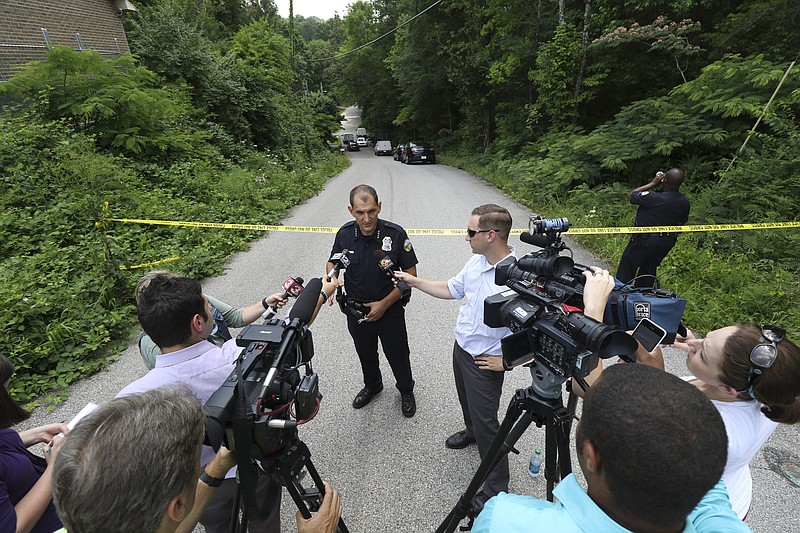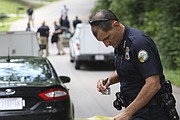Timeline of Chattanooga's Violence Reduction Initiative
April 2013: Mayor-elect Andy Berke first pitches VRI to city July 2013: Berke marks 100 days in office, promises the city will see fewer shootings by 2014 December 2013: Berke pledges to bring VRI to Chattanooga March 2014: Police and city leaders hold the first call-in June 2014: Richard Bennett, the main contact for gang members in VRI, is arrested June 2014: City and police leaders cut ties with Bennett June 2014: The city asks for a new community partner to replace Bennett July 2014: City choses Hope for the Inner City as Bennett's replacement August 2014: Police say 58 people have landed jobs through VRI September 2014: Two of three charges against Bennett are dropped October 2014: Police plan to expand the VRI effort to target non-gang members March 2015: Chattanooga agrees to rehire the National Network of Safer Communities May 2015: About a year after VRI's start, gang-related homicides are up, overall gang violence is down September 2015: Chattanooga renews its contract with Hope for the Inner City October 2015: 11 of 12 Chattanoga police street crimes team members quit January 2015: A foundation pulls funding intended for VRI's social services work November 2015: District Attorney Neal Pinkston says he won't give VRI cases priority February 2016: City councilmembers question whether VRI is effective Source: Times Free Press archives
View other columns by David Cook
Not that long ago, I witnessed a "call-in," a signature event in the city's Violence Reduction Initiative.
The evening felt heavy, like an intervention. Thirty gang members - invited via official white letters with gold seals from their parole officers - came that night. They were led one by one to the front rows of an annex room at Olivet Baptist Church, where 100 or more community members - from the streets to the mountains - waited in straight-backed chairs behind them, in complete silence.
Then the messaging began.
Public Safety Coordinator Paul Smith stood and spoke first. Then police Chief Fred Fletcher. Following them was a long line of Powerful People, all of whom said - repeatedly, clearly - the same thing.
We want you alive. We want other people alive. So if you keep shooting, we will come at you with all we have.
Badges were everywhere. The feds, district attorneys, detectives, local and state agents, all represented. A federal prosecutor PowerPointed through slides on jail times and max sentencing. A patrol cop showed pictures of gangbangers now serving life. Keep shooting, he said, and this will be you.
I watched the bodies and faces of these 30 young men, who had for years practiced such bitter and unyielding hardness. Before such threats, they seemed unmoved.
Then the tone of the night shifted.
Two men from the nonprofit Father to the Fatherless spoke. One man, a former gang member, told his story. The other handed out cards with a phone number. Call anytime, he said, for any reason. I can get you help.
In the night's emotional climax, a mother - her son was shot and killed in the streets - embraced each of the 30, saying, "You could be my son."
"I love you," she told them, with tears.
The formalities ended. A receiving line formed, and many of the 100 audience members rose to shake hands, hug and encourage these 30 gang members, whose body language was now softer, lighter. I'd heard some were crying.
Police brought out pizzas while Fletcher poured orange Fanta into the red Solo cups of guys who, on any other night, his men could be arresting. Around the room, officers made small talk with the 30.
It was quite dizzying. Max sentencing one moment? Pepperoni the next?
It was oddly beautiful. Has there ever been a time when such attention and intention - we want you alive, we want others alive - has been shown to 30 gang members in one night?
It was also out of balance.
The first half of the night? The full force of federal, state and local power was there, greeting these men not with aid, but with threats. It was the long arm of the law at its longest.
The second half? The part with the nonprofit and phone number and grieving mother? It felt disproportional and smaller. Real, but smaller.
To threaten these 30 with the full power of government, yet for the same government to offer no equally weighted off-ramp into citizenship and productive life is a false choice. The deck is stacked, activists say, and that night, it seemed stacked again: the feds and prison system and handcuffs compared to a shoestring nonprofit, grieving mother and pizza?
Want to threaten them with federal prosecution? Fine. Then also surround them with job applications, training and trauma counseling. Where was the school system that night? Or the Chamber of Commerce?
Let's say those 30 swear off violence forever.
Then what?
"I need 12-hour shifts," one of the 30 said, driving off into the night. "That way, I can't get into nothing."
But here's the real heavy: That isn't the police department's fault.
VRI is taking a lot of shots right now, but don't read this as one of them. Fletcher's vision for community policing is moral and good, a U-turn away from animosity and distrust; it is police work that prizes relationships. How many times have Fletcher and his men and women worked - from funerals to front porches - to restore broken trust? The answer: more times than any of us know.
Hot-mouthed critics want to scrap VRI? For what? More saturation? More arrests? More aggression?
"This is the opposite of stop and frisk, the opposite of saturation," Fletcher said.
VRI won't solve gang violence because it can't. Law enforcement isn't about job creation; plus, gang violence has its roots elsewhere. Like broken homes. A dysfunctional school system. Poverty. ("There were roaches in our cereal boxes," one man said.) Normalized incarceration. Addiction. PTSD in 7-year-olds.
All of it decades, if not centuries, in the making. To daydream that VRI can swoop in and solve it all is to forget the context and history that allows and encourages gang violence.
Yes, we need intervention.
And of a different sort.
David Cook writes a Sunday column and teaches at McCallie School. Contact him at dcook@timesfreepress.com or 423-757-6329.


